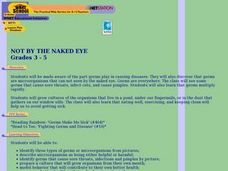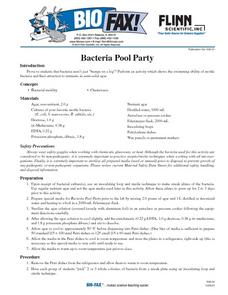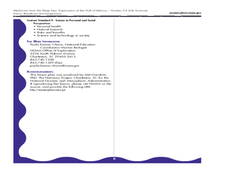University of Southern California
Mastering Microbes
Small but mighty! Learners explore the role of microbes in a healthy ecosystem. An engaging lesson asks pupils to design an aquaponics system that demonstrates that healthy microbes are necessary to maintain the ecosystem.
Exploratorium
Skin Shield - Explore the Body’s First Line of Defense Against Pathogens
Make pathogens and the body's defense systems come alive for young biologists in a hands-on activity. Investigators model the skin's protection against infection by observing and comparing changes in a punctured tomato and an intact...
Curated OER
Microbes 1: What's Bugging You?
Middle schoolers build on existing knowledge of microbes, focusing on the relationship between microorganisms and foodborne illness, as well as the implications that foodborne illness has on human health.
Curated OER
Microbe Experimentation
Seventh graders study microorganisms in their environments by experimenting with milk products. In this microbes lesson, 7th graders read background information about microorganisms in yogurt and soured milk. Students then follow a...
Baylor College
The Variety and Roles of Microbes
Mini microbiologists play a card game in which they group microorganisms by groups: virus, fungus, protist, or bacteria. Then they identify the roles different microbes play in the natural world and explore how humans effectively use...
Curated OER
Yeast Power!
Students examine how not all microorganisms are bad and that some can actually be beneficial. In this yeast lesson students complete an experiment with yeast and answer questions.
Curated OER
Diseases
Sixth graders create a type of notebook or journal using colored copy paper on which to take notes. They complete research on a certain disease and report on it and then design their own disease causing bacteria or virus. Finally, 6th...
Curated OER
Discovery Science Center Activities
Fourth graders complete a variety of experiments to meet science goals. In this life sciences lesson, 4th graders make yogurt, discover the attraction of opposite charges in electricity, learn the effects of glaciers, and explore...
Curated OER
Micro-organisms
Students learn what a micro-organism is. In this micro-organism lesson, students understand that micro-organisms may be too small to see. Students learn microorganisms could be bacteria, fungi, something beneficial or a harmful microbe....
Curated OER
Yeast Cells and their Environment
Students study the scientific method and explore how to design an experiment. In this investigative instructional activity students explore and hypothesis an experiment then carry it out to find the results.
Curated OER
Bacteria Pool Party
Students investigate the organisms of bacteria. They are given a culture of bacteria that can be observed under a microscope. The students make observations that are recorded. The lesson includes the mention of specific safety...
Curated OER
Seed to Soup Organic Garden
Have your young biologists visit decomposition stations as they explore the process of organic material. This activity involves some set-up as kids will be visiting 13 desks to collect colored paper each representing a different element...
Curated OER
Inquiry-based Investigations into Pond Water Microorganisms
Young scholars become familiar with common microorganisms and experience exploring the microbial world.
Curated OER
Microbiology Lesson Plan Aseptic Technique
Students examine the importance of aseptic technique, become familiar with media plates, and general microbiology techniques. They study the benefits and dangers of bacteria and other microorganisms in their lives.
Curated OER
Lesson Plan: The Cell- A Historical Perspective
Students discover the impact the invention of the microscope had on scientific discovery as well as the concept of spontaneous generation and the cell theory. Students examine these scientific concepts through a WebQuest and by viewing a...
Curated OER
Plankton Parade
Plankton isn't just a tiny cartoon character, it's also a very important food source for animals around the world. Budding scientists discuss the types and functions of plankton, including where they are found, how they are caught, and...
Curated OER
Wildlife Variety Show: Biodiversity In Illinois
Eighth graders write a short report in first person about any plant or animal found on a list of Illinois species. They become the character of the plant or animal and give a short report describing the plant or animal.
Nuffield Foundation
Working with Immobilized Enzymes or Microscopic Organisms
Let the lab be a catalyst to learn about enzymes. Scholars create alginate beads filled with yeast. As part of an investigation into enzymes, they see how these beads provide a catalyst to the reaction of glucose into ethanol.
Curated OER
Microfriends: Medicines from the Deep Sea
Students explore the concept of beneficial microorganisms. In this microorganisms lesson, students observe different bacteria found in organisms Students discuss and describe three ways that microorganisms benefit humans.
Curated OER
What Are the Layers of the Rain Forest?
Young scholars investigate the different levels of the rain forest by comparing it to an apartment. In this ecology lesson, students practice using forest related vocabulary words and complete a vocabulary data sheet. Young scholars...
Captain Planet Foundation
Rotting Away
What happens at the end of a plant's life cycle? Show kids the natural way that plants show that they're decomposing, as well as the importance of compost, with a lesson about living organisms. After reading Log Cabin by Anne Schreiber,...
Captain Planet Foundation
Worm Your Way Out of This
How can you provide healthy soil for your garden? Study worms, bacteria, and other microorganisms in a lesson about decomposition and organic compost. After discussing what you know about worms and watching a video, watch what worms do...
Curated OER
Spud Smear
Learners study various samples of microorganisms in petri dishes. In this microorganism lesson, students place various samples of items in petri dishes and observe them after several days of incubation.

























